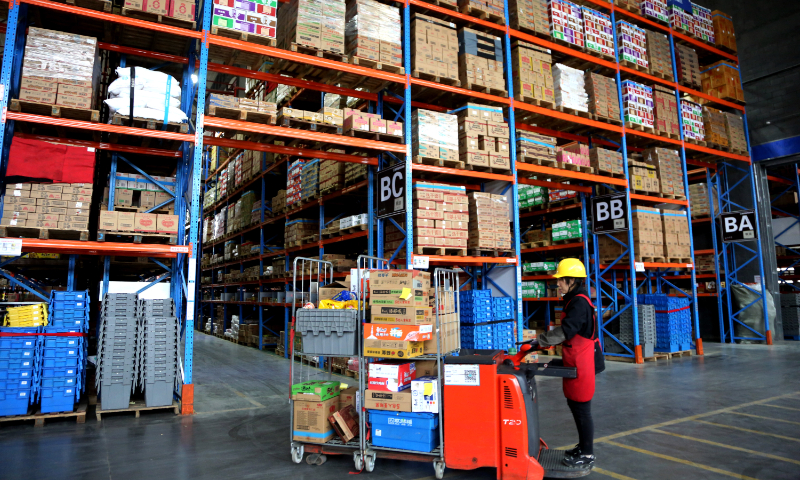S.Korea requires Chinese e-commerce platforms to hire domestic representatives, signaling unfair competition: experts

A worker sorts products for transshipment at an e-commerce logistics warehouse in Lianyungang, East China's Jiangsu Province, on December 10, 2023. As the Double 12 (December 12) shopping festival approaches, e-commerce warehouses are preparing the logistics of peak online shopping and shipping. Photo: VCG
Multiple Chinese e-commerce platforms operating in South Korea, including AliExpress, Temu and Shein, will be required to hire domestic representatives by a South Korean business regulator as their market share is rapidly expanding in the country.
This is seen as a targeted move against popular Chinese online retailers, and will disrupt normal China-South Korea economic and trade cooperation if related regulations are further abused, Chinese experts noted.
South Korean Fair Trade Commission chairman Han Ki-jeong said on Wednesday during an economics-related ministers' meeting that the country will revise its e-commerce act, requiring foreign online platform operators to designate a domestic agent to be responsible for consumer services, which is set to be finalized within the month, South Korean media outlet the Korea Herald reported.
"As the use of foreign online platforms increased rapidly in a short period, the number of consumer complaints has also increased," Han was quoted as saying.
According to data released by South Korean market tracker Wiseapp on March 6, users of AliExpress in South Korea hit 8.18 million in February, more than doubling from 3.55 million users from one year earlier, ranking second following South Korean shopping app Coupang in terms of the number of users.
Temu ranked fourth with 5.81 million users in February. Shein's users also hit a historic high at 680,000 users.
South Korea has a relatively small market size, thus the government usually holds a stance to protect domestic companies rather than ensure fair competition with foreign companies, Zhang Huizhi, vice dean of the Northeast Asian Studies College at Jilin University, told the Global Times on Thursday.
"The China-South Korea cooperation in e-commerce should be an emerging and important collaboration field, but it could also be affected by the emerging trend of trade protectionism in South Korea," said Zhang, noting that the consequence should be viewed over the long term.
Analysts called for South Korea to value the country's trade ties with China, as China remains South Korea's largest trade partner, with bilateral trade volume reaching $310.74 billion in 2023, according to the General Administration of Customs of China.
Chinese firms are urging South Korean authorities to lower the barriers to entry for foreign investment, enhance the stability and transparency of business policies and regulations, and strengthen innovation cooperation with China in the fields of the digital economy, clean energy, new-energy vehicles (NEVs) and other, according to the 2023 South Korea Business Environment Report released by the China Council for the Promotion of International Trade (CCPIT) on February 29, 2024.
Chinese enterprises attach great importance to investment and operation in South Korea, given the close economic ties between China and South Korea and the deep integration of industry and supply chains, a spokesperson for the CCPIT said on February 29.
As one of the examples, AliExpress' owner Alibaba announced to further invest $1.1 billion in the next three years to expand its business in South Korea, and also vowed to invest 100 billion won ($75.95 million) to open a customer services center, Yonhap News Agency reported on Thursday.
Alibaba's entire investment plan is projected to create 3,000 jobs in the South Korean market over the three years.



